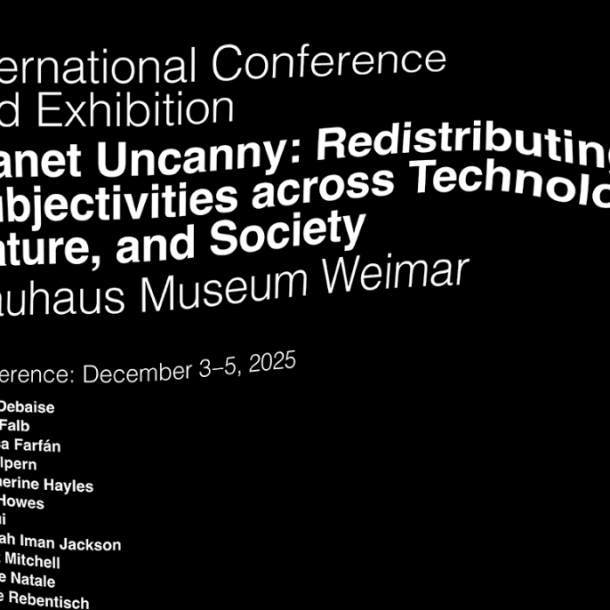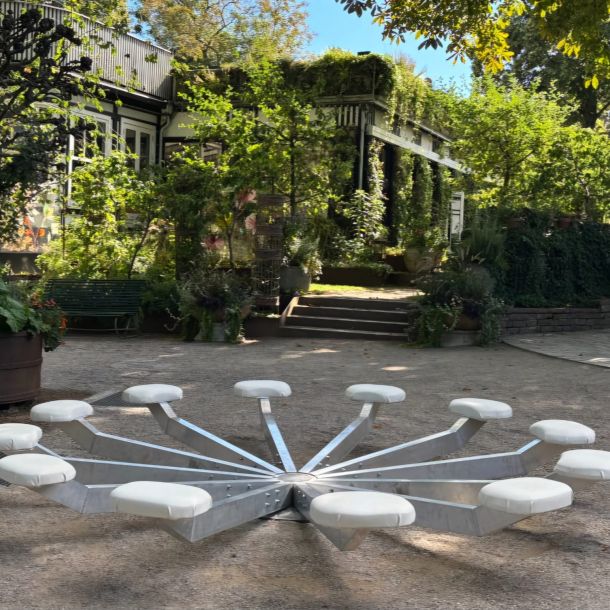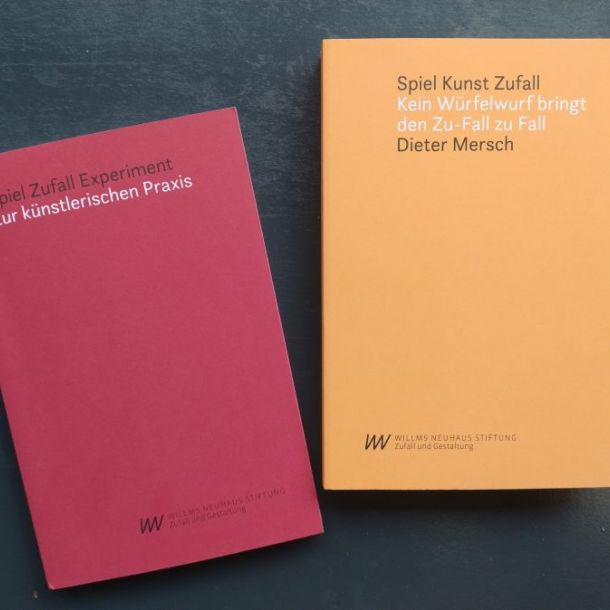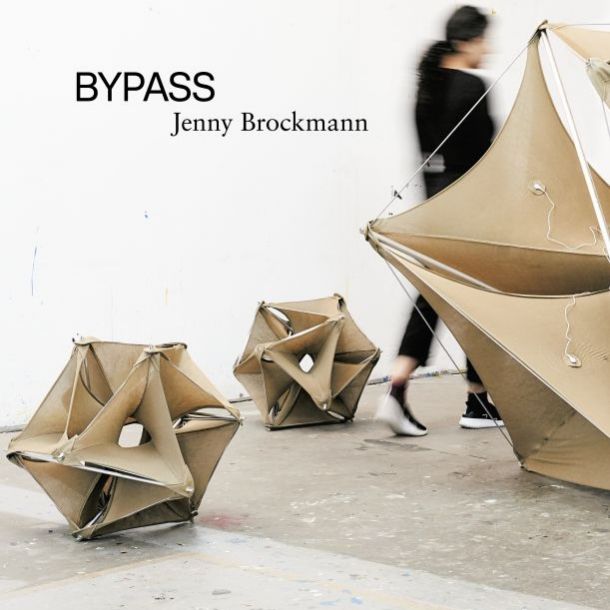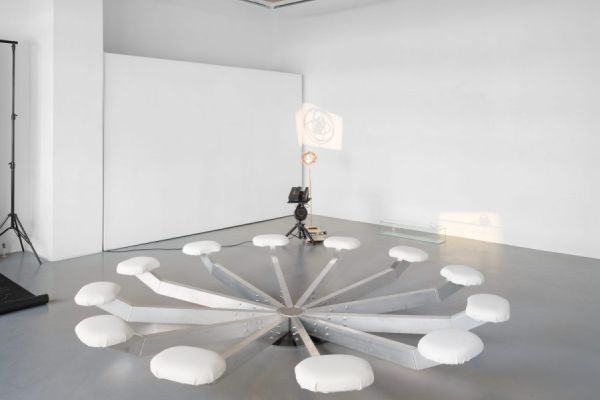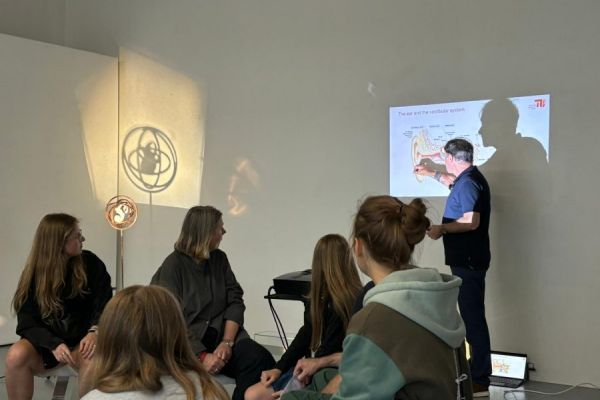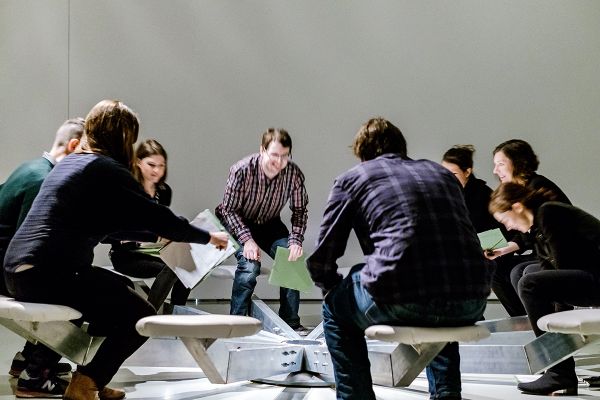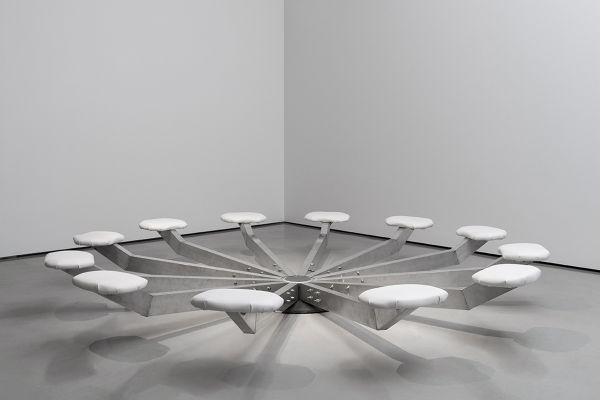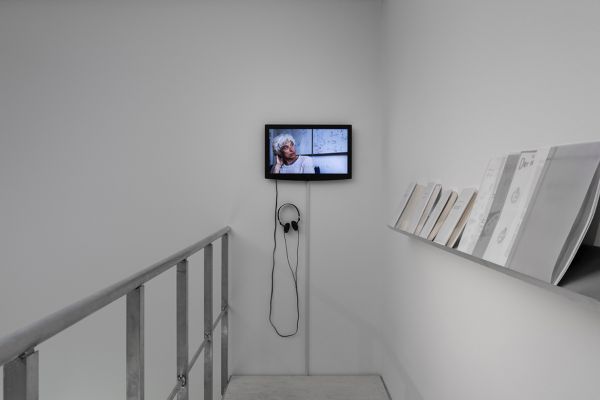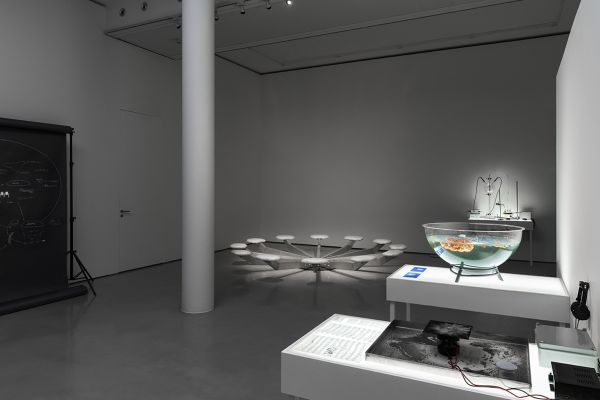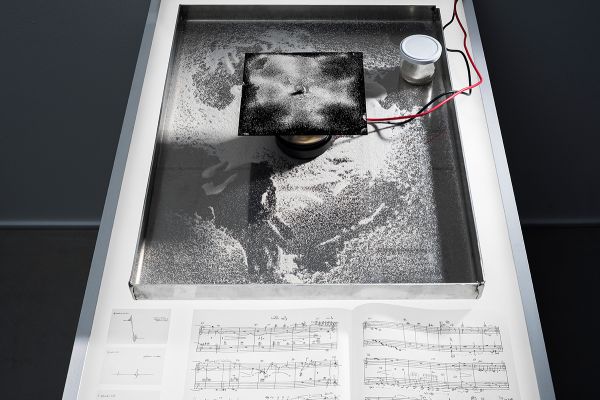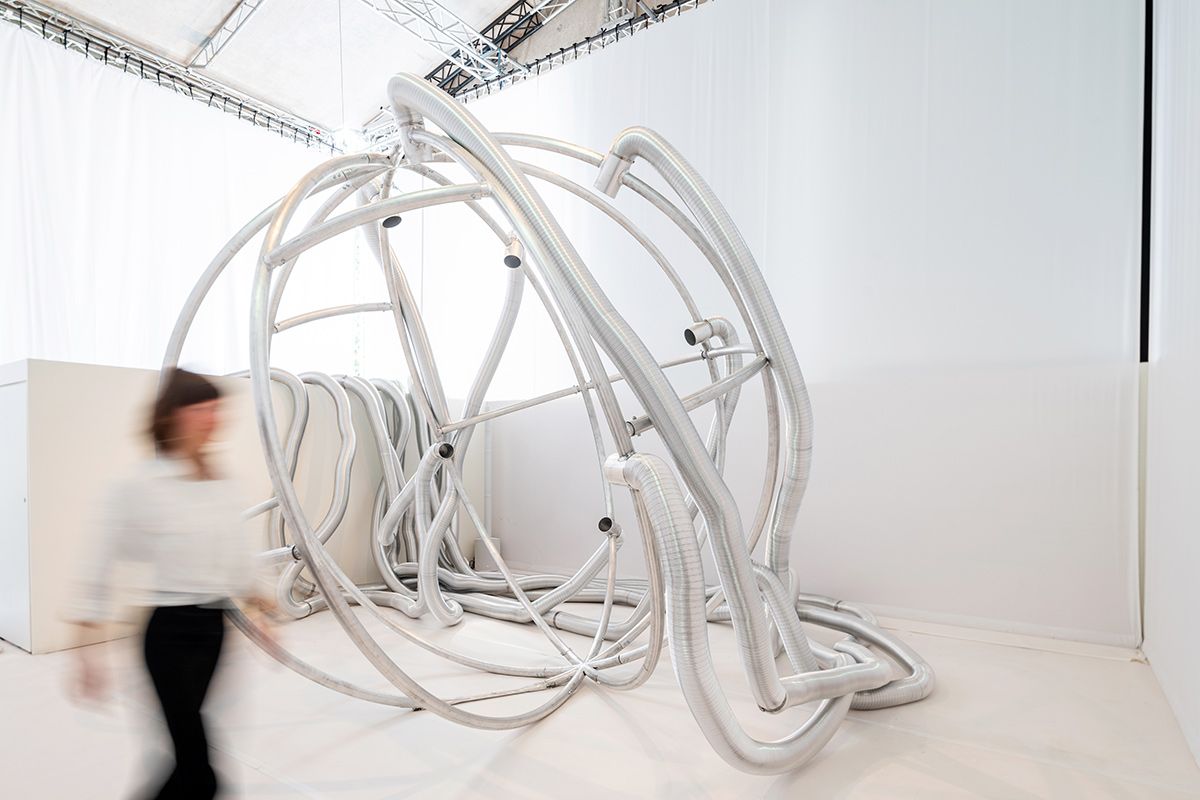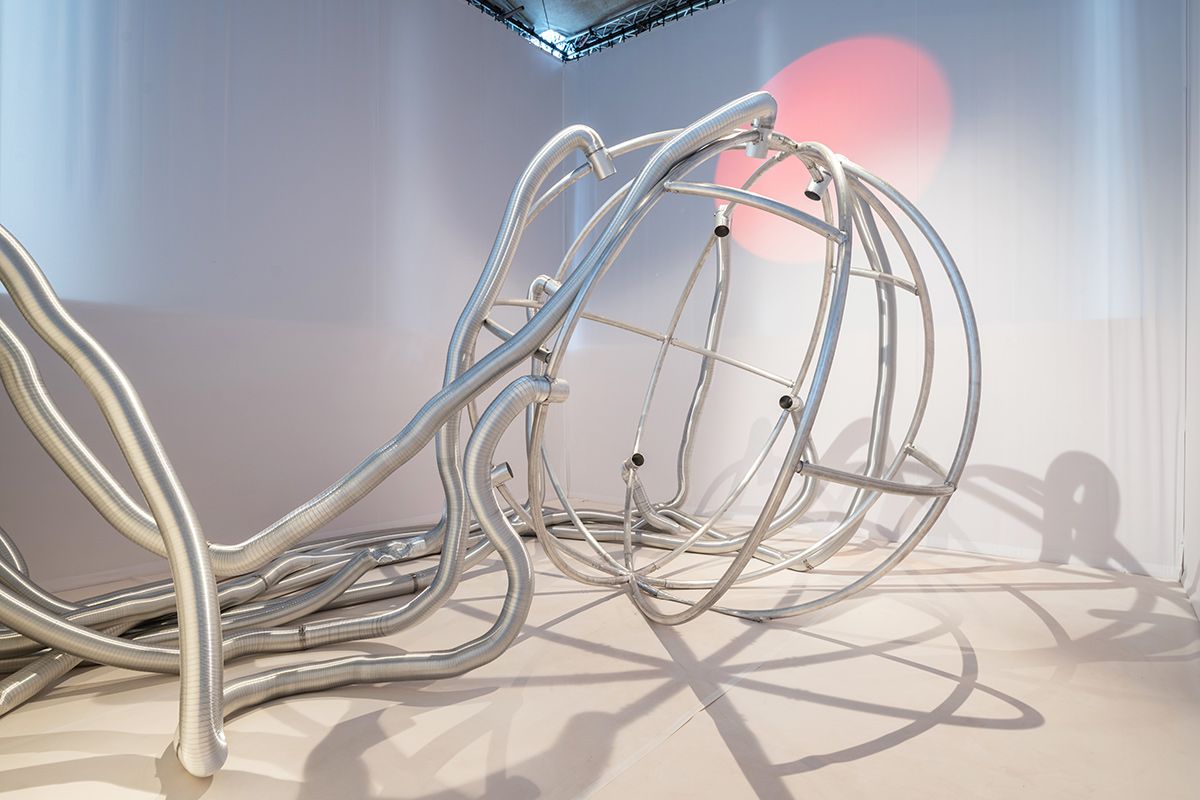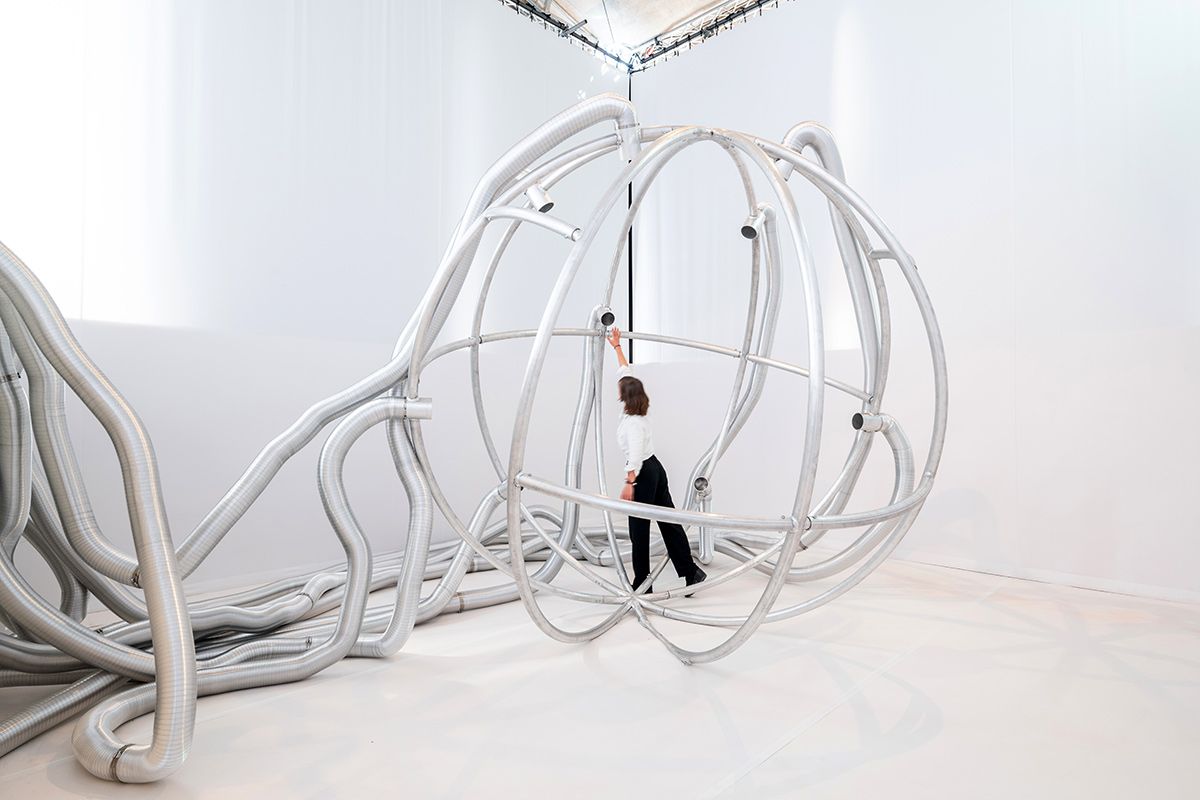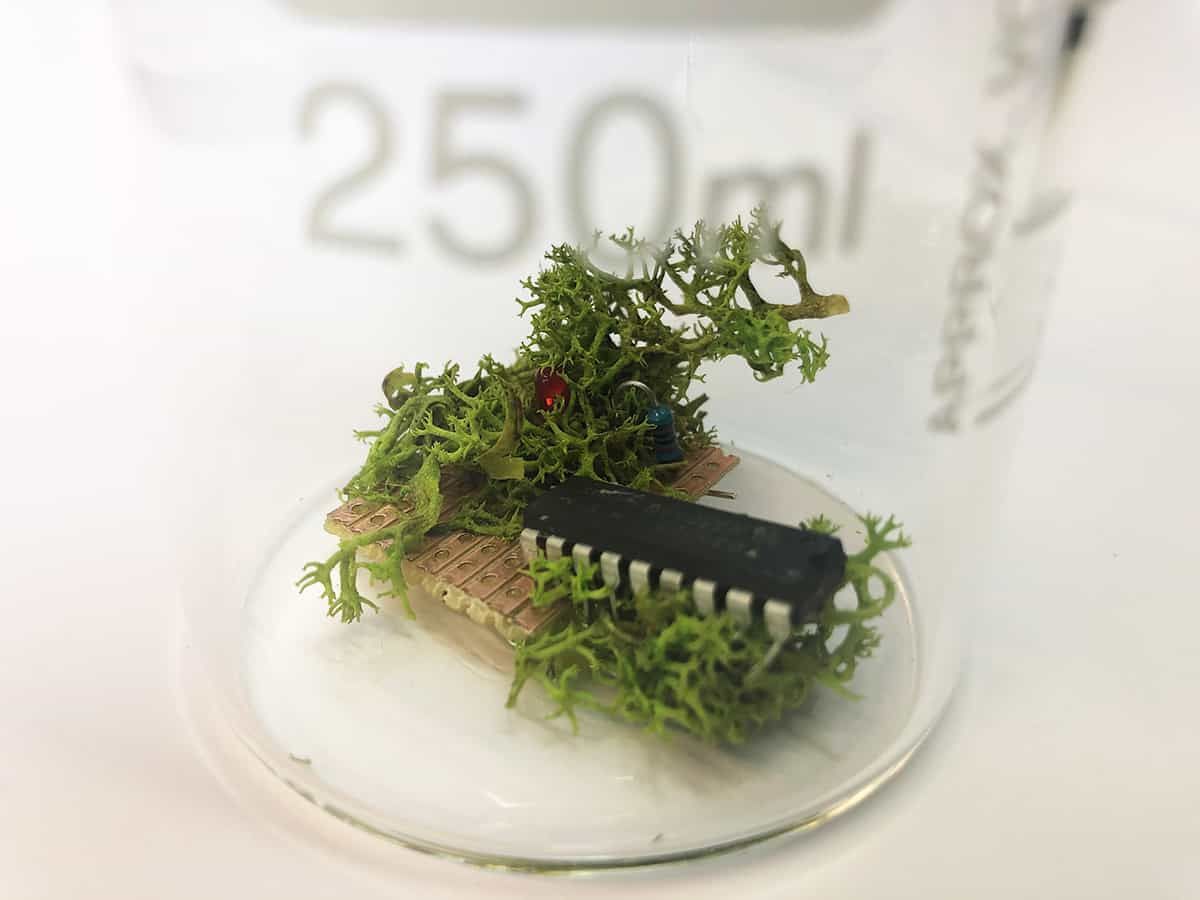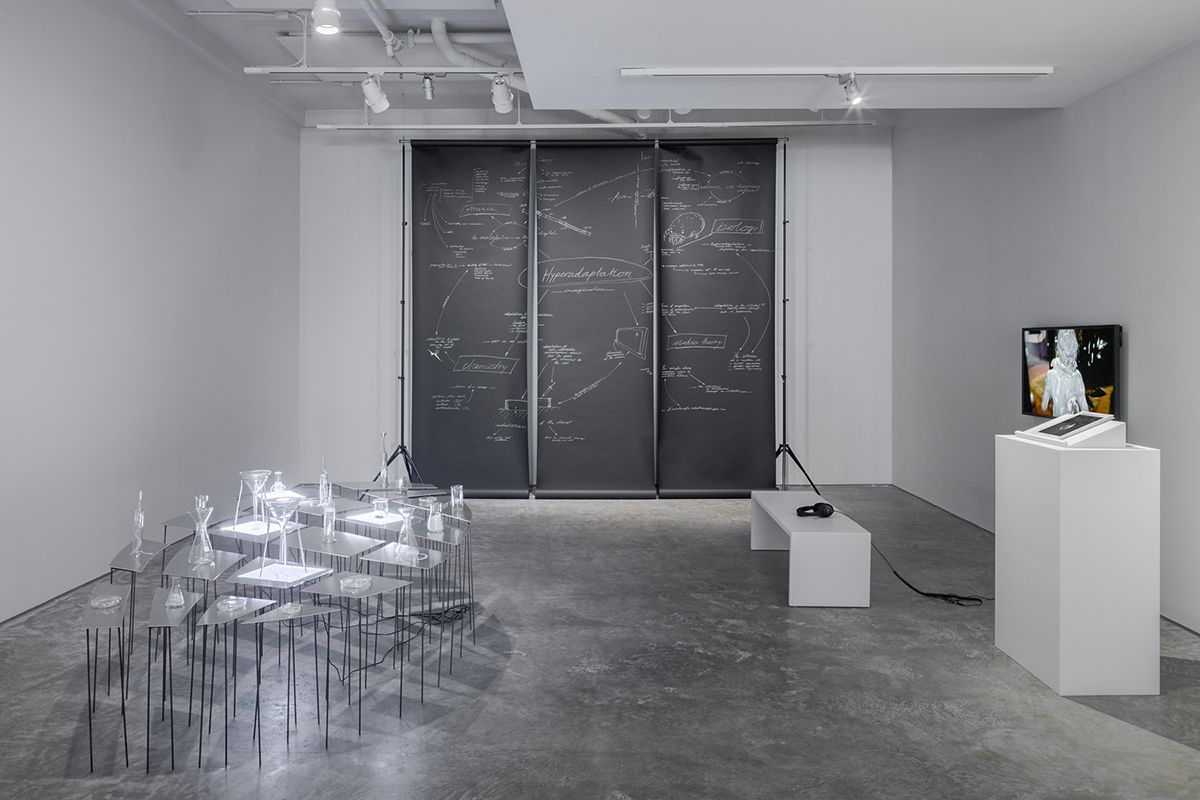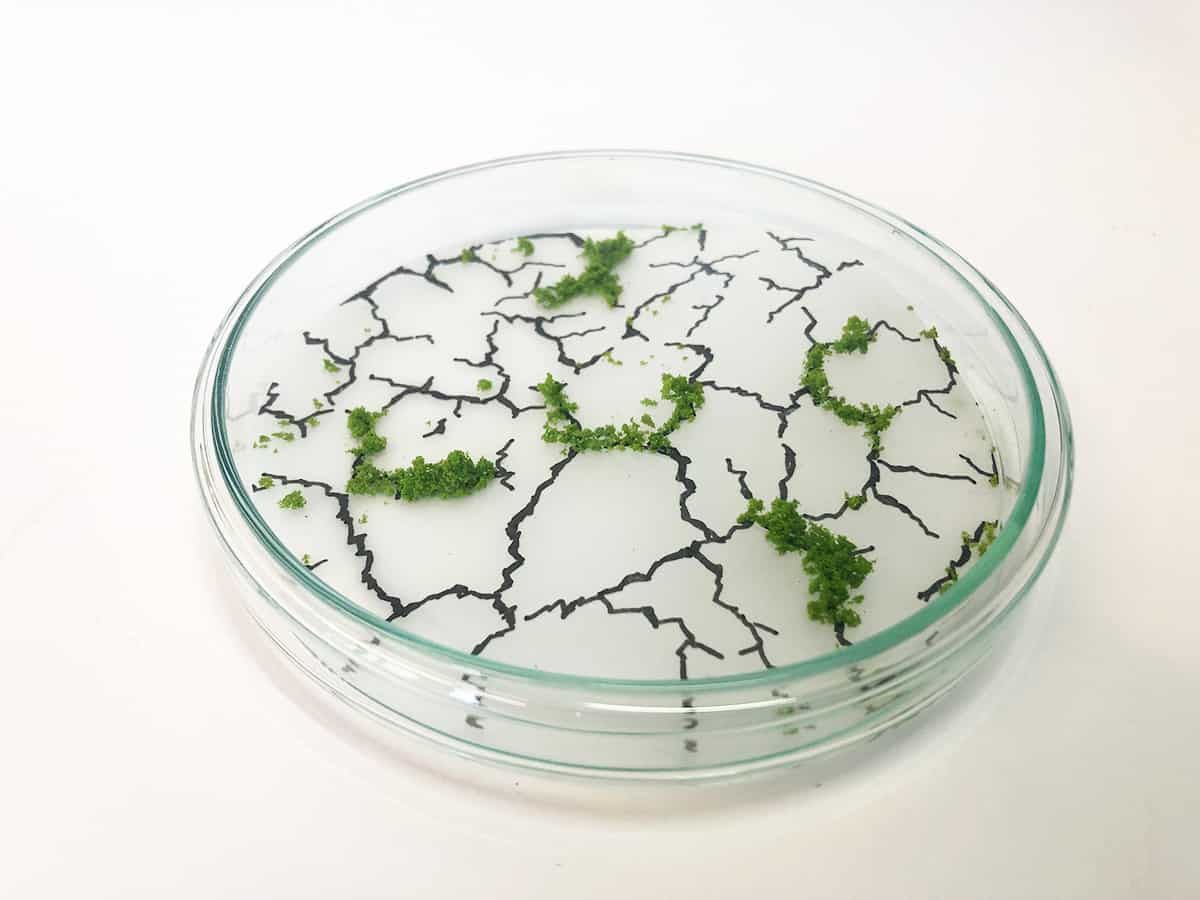About
Jenny Brockmann (1976, Berlin) is an artist and sculptor living in Berlin and New York. Her works combine technology, science, and art, and have been shown internationally. She studied fine art at the Berlin University of the Arts, where she was a student of Rebecca Horn, and received a diploma in architecture from the Technical University of Berlin. Brockmann creates works characterized by discursive aesthetics.
News
Work
(Im)balance organ-BALANCE
Jenny Brockmann: ‚On Ambivalence‘, exhibition view at Dorothée Nilsson Gallery, 2024.
Copper, glass and other materials
Brockmann has been working on the (Im)balance organ-BALANCE project since 2022. The organ of balance is located in the inner ear. It is a complex form that corresponds to the transparency and opacity of cognitive processes related to orientation and the position of the head or body in space. Brockmann’s research project involves testing sculptures of the organ. She uses cutting-edge computer technology to bring the non-human and the human, the natural and the artificial into communication in a way that challenges the usual relationships between object and subject.
The organ of imbalance is also referred to in a 100-fold enlarged organ of equilibrium in glass. The different surface compositions of the glass form make the sculpture either translucent and thus allow views through it or give it an opaque structure through which the forms behind the glass cannot be seen or can only be seen dimly. The sculpture absorbs the surroundings and reflects them. The surface plays a key role here, as the glass has the capacity to reduce, enlarge and distort the reflected environment depending on its shape.
Hereby Brockmann points to the circumstance that the sense of orientation is equally connected to our inner self. It reflects the environment within us, but the stimulus is perceived differently depending on our predisposition and the paths and inclinations appear short or long, strongly or slightly deviating. Sometimes, both the glass reflection and the perceived orientation in space give rise to illusions and appearances that point to something that belongs more to the realm of the imagination than to the real image, and it is precisely then that a poetic moment of the intermediate dimension opens up.
Irreversible Moment
Jenny Brockmann: ‚Open Lab ‚Irreversible Moment‘, 2016. Various materials. Exhibition view, Ernst Schering Foundation, Berlin. Photo: Bernd Hiepe © the artist
Various materials, various sizes
In her ongoing research on the “Irreversible Moment” Jenny Brockmann is searching for the reason behind fundamental structural and spatial changes, or the transformation of bodies in space. Further, she enquires about the socio-political significance of the “Irreversible Moment” . When and how do social, ecological and economical irreversible turning points occur? And is it possible to find new ways in which to confront the “Irreversible Moment” ?
Among other things, Brockmann searches for forms of visualization and thus also for intellectual approaches to this point of no return, i.e. the point from which there can be no going back, the moment in a process that leads to something never again being as it was before.
It is a work emerging from cooperation between interdisciplinary experts from e.g. the fields of chemistry, physics, dance, and music.
Cold – On Sensitivity
Jenny Brockmann: ‚Cold – On Sensitivity‘, 2019. Aluminum, refrigeration unit, Aluflex pipes, valves, controller. Exhibition view at Pavillon im Ilm Park, Klassik Stiftung Weimar, project ‚Heat Cold Devices. Bauhaus – Attempting Balance’. Photo: Thomas Müller © the artist
Aluminum, cold air, tubes, controller
In her installations which often develop their full potential through the actions of the visitors, Jenny Brockmann integrates devices and methods which are frequently used in scientific research. In her new project «Cold – Study of Sensitivity», the artist has developed a room of sensory experience for one person at a time. The room invites the visitor to become better acquainted with his/her own sensitivity and sensibility to process of cold (and heat). It also allows one to reflect on the psychological effects of cold. For cold is not merely a meteorological Uraufführung 107 phenomenon; it can also describe the social condition of being disconnected and distant – a trend that increasingly poses a challenge to our coexistence. With this work, Brockmann continues a project she began at the Kunstfest 2018, highlighting the work of Gertrud Grunow who gave instruction on attentiveness, harmonisation and balance at the early Bauhaus in Weimar. With her project, Jenny Brockmann places the Bauhaus at the centre of current social debates on climate change which are no longer separable from the notion of achieving a harmonious coexistence, and for which she now proposes a training programme for our own sensitivity. Most people nowadays are increasingly uncertain about nature and technology, what they have in common and what they don’t, what they are and what they aren’t. Humans and their technical surroundings are inextricably interwoven and often even coalesce. We interact more and more every day with technical devices and systems. Since the Bauhaus and especially since the beginning of the 21st century, we are finding it harder to answer the question of what nature is. While scholars in the 1920s described the strengthening ties between humans and technology in more aesthetic-visionary terms, today in the age of digitalisation it has become clearer than ever how interconnected we are with technology and how impossible it has become to sever those ties. If everything is design, then what is nature?
The project «Apparatus of Heat and Cold – Bauhaus Attempting Balance» has been investigating the historical Bauhaus in Weimar and its impact on contemporary art and culture in various exhibitions, a publication and discussion forums since 2018. This year, the project curators have invited four internationally known artists and artist collectives to explore the uncertainties and potentials arising from humantechnical existence, and by extension, the cultural and intellectual temperatures and concept of nature at the Bauhaus. While the events in 2018 focused on heat and cold in relation to Bauhaus colours and colour theory, form-building and design, and balances and imbalances in their diverse aesthetic and social facets, this year’s project applies heat and cold to the understanding of nature at the Bauhaus.
Concept: Jenny Brockmann
Research + text: Paulina Olszewska
Planning: Atefeh Farzandi
Curators: Janek Müller, Niklas Hoffmann-Walbeck, Pamela Schlewinski
Funding: German Federal Cultural Foundation »Bauhaus Today« / project »Heat Cold Devices« and Klassik Stiftung Weimar
Hyper Adaption
Jenny Brockmann: ‚HyperAdaption‘, 2020. Various materials. Exhibition view: ‚Collaborative Survival‘ 2021, 601Artspace, New York City. Photo: Rafael Gamo © the artist
Various materials, various sizes
Collaboration between Jenny Brockmann (visual arts), Lynn Christenson (ecology at Vassar College, NY), Peter Groffman (biochemistry at CUNY, NY), Lathan Hardy (woodwind music) and Lauhona Ganguly (media theory at New School, NY).
Conceived especially for the exhibition “Collaborative Survival, Ecologies of Encounter” curated by Danni Shen and realized at 601artspace, the work unfolds in two parts.
The first part consists of “Archive of a Future Memory #2—HyperAdaptation”, a 5 foot wide, 8 foot long, and 2 foot high, 3-dimensional shelf made of aluminum and LED tiles, on which fabricated objects and materials are arranged that refer to the conversations the artist had with a group of
four New York-based scholars/researchers from different disciplines (biology, AI research, music, ecology). Together two questions in the face of current Anthropocene discourse had been addressed: (1) How does resilience, adaptability and/or non-adaptability reveal itself within species, environments, and social interactions? (2) How might a programmed being refuse and emancipate itself from its surroundings — can AI pose resistance, or not? An accompanying public dialogue event in the gallery with these collaborators will center around the sculpture “Archive of a Future Memory #2 — HyperAdaptation”. The project examines the constructed divisions of “nature” and “culture,” as well as the empirical bounds of scientific knowledge production, by creating an interdisciplinary space within the gallery.
The second part, “2020-20-02 — HyperAdaptation”, an 11 foot 6 inches wide roll of black paper fixed on tripods and hanging down from a height of 10 foot 11 inches, unfolds the complex cartography of ideas, questions, and positions related to the work’s title, HyperAdaptation. Carried out in delicate white lines, the short notes and concentrated illustrations are an attempt at making knowledge processes comprehensible, while the method of cartography (mapping)—used in natural science to visualize spatial information about landscapes or celestial bodies—is adopted to increase the ability of orientation within the landscape of thoughts on “HyperAdaptation”.
In addition to the artworks, a workshop and a discursive performative event around the collaboration with the scientist experts had been arranged by 601artspace.
In collaboration with: 601artspace
Funded by 601artspace and German Consulate General, NY
CV
1996-2007 Technical apprenticeship
Studies in literature, philosophy, architecture (MA)
2002-2007 Studies at the College of Fine Arts, Berlin and Hunter College, NYC
2007 MFA at the College of Fine Arts, Berlin, DE
since 2020 Research associate at the Faculty of Media, Bauhaus University, Weimar, DE
2024
On Ambivalence, Dorothée Nilsson Gallery, Berlin, DE
2022
#MELODY , ruruHaus, documenta fifteen, Kassel, DE
Bypass, Kasseler Kunstverein, Friedrichsplatz, Kassel, DE
2021
#LIMITS, Goethe Institut London, UK
#ENERGY/STATE/REACTION, Hearth Gallery, Cardiff, UK
2020
Informed Desire, Kunsthaus Dahlem, Berlin, DE
2019
Cold – On Sensitivity, Kunstfest, Weimar, DE
Dialogues on a Future Communication, 1014, New York, US
2018
Four Pieces and a Half , Residency Unlimited, New York, US
Of Colour and Light, Kleine Orangerie Schloss Charlottenburg, Berlin, DE
2017
Uncertain Knowledge, Galerie Gerken, Berlin, DE
Fluid, WNS Foundation, Berlin, DE
2016
The Visible and the Perceptible, Elektrownia, Radom, PL
Open Lab ‚Irreversible moment‘ , Schering Foundation, Berlin, DE
2025
Planet Uncanny, Bauhaus-Museum Weimar, DE
CHART Tivoli, Kopenhagen, DK
On Orientation, Kunsthaus Dahlem, Berlin, DE
2024
Re:Bypass, M BOOKS, Weimar, DE
HEAT/HITZE, Kotti-Shop, Berlin, DE
Concertare Forte, Kunstfest, Weimar, DE
2023
Who is Janina Węgrzynowska, Studio Galeria, Warsaw, PL
Spring Never Comes Again…, Zachęta – National Gallery of Art, Warsaw, PL
Who is Janina Węgrzynowska, BWA, Bydgoszcz, PL
Bauhaus Psychology, Kunstfest, Weimar, DE
2022
Spooky Actions, Nova Art Space, Kunsthaus Erfurt, DE
Prototype Balance, Fraunhofer Institut, Rostock, DE
2021
Collaborative Survival, 601Artspace, New York, US
2020
Architectural Art Spandau, ZAK – Center for Contemporary Art, Berlin, DE
What Are You Up To, insitu collective, online exhibition
Nonsenslessness, 48h Neukölln, Berlin, DE
Color, Sound, Movement, Online Video Screening, Goethe Institut Warsaw, PL
2019
Experiment: Zukunft, Kunsthalle Rostock, DE
Eco Shifters, La Fabbrica del Cioccolato, Torre-Blenio, CH
Resonances III – DATAMI, JRC of European Commission, Ispra, IT
Let’s Talk About Modernity, Jam Factory Art Center, Lviv, UA
Resonances III – DATAMI, BOZAR, Brussels, BE
Balanceakte, Kunstverein Springhornhof, DE
Bauhaus in Balance, German Consulate General, New York. US
Eco Shifters, Video Screening, Carriage Trade, New York, US
2018
Von der Schönheit der Formel II, Kommunale Galerie Adlershof, Berlin, DE
Ein Archiv von Hitze und Kälte , ACC Galerie, Weimar, DE
C-Exhibition, Starke Foundation, Berlin, DE
2017
Von der Schönheit der Formel, Kommunale Galerie Adlershof, Berlin, DE
Seat#6, Centre of Polish Sculpture in Oronsko, PL
Corridor III: VALDEMAR DAA, Viborg Kunsthal, DK
Alles zur Zeit, Vögele Kultur Zentrum, CH
24hBRO, Krupa Gallery, Wrocław, PL
2016
Geheimnis, Kunsthaus Potsdam, DE
Gedok Urban, Kommunale Galerie Wilmersdorf, Berlin, DE
Circular Movements, Kunsthaus Potsdam, DE
2022
Grant from the City of Kassel, DE
Grant from Tadeusz Kantor Foundatio
Grant from Adam Mickiewicz Institute
2021
Project Grant from Goethe Institut London, UK
Residency at AiR 351, Cascais, PT
Grant from German Consulate General NYC, US
2020
Willms Neuhaus Prize by Willms Neuhaus Foundation
Research Grant from Goethe Institut London, UK
Grant from Investitionsbank Berlin, DE
Research Grant from Kunstfonds Foundation
2019
Residency at JRC, European Commission, Ispra, IT
Project Grant from 1014, New York, US
Project Grant from JRC, European Commission
Project Grant from German Federal Cultural Foundation, DE
»Bauhaus Today« / project »Heat Cold Devices«
2018
Residency at Residency Unlimited, New York, US
Research Grant from Berlin Senate, DE
Project Grant from German Federal Cultural Foundation, DE
»Bauhaus Today« / project »Heat Cold Devices«
2017
Grant from Willms-Neuhaus Foundation
Residency at Centre of Polish Sculpture in Orońsko, PL
2016
Grant from Schering Foundation
Grant from Goethe Institut Warsaw, PL
2015
Residency at Skaftfell, IS
Grant from Goethe Institut Denmark, DK
2014
Residency at ISCP, NYC, US
Residency at Artport Tel Aviv, IL
Grant from Goethe Institut Tel Aviv, IL
2013
International Exchange Program Grant
2009-2015
Studio Grant from the City of Berlin, BBK Berlin, DE
2010
Project Grant from Karin Abt-Straubinger Foundation
Residency at Warteck pp, Basel, CH
2007
Grant for international Graduate Study at Hunter College, NYC, US
2005-2008
Scholarship of the Friedrich-Ebert Foundation
#Energy/State/Reaction, series of discursive performances at Hearth Gallery Cardiff, UK
Bauhaus-Rhythmen, lecture, Bauhaus-Universität Weimar, DE
Medien und Organe, lecture, Bauhaus-Universität Weimar, DE
#LIMITS, series of discursive performances at Goethe Institut London, UK
Artist Talk „Informed Desire“, Kunsthaus Dahlem, DE
Entanglement#1: CARE, discursive performance, 1014, New York, US
Entanglement#2: RESILIENCE, discursive performance in collaboration with Vera List Center for Art and Politics at The New School, 1014, New York, US
Entanglement#3: VIOLENCE, discursive performance, 1014, New York, US
Entanglement#4: REFUSAL AND EMACIPATION, discursive performance, 1014, New York, US
2019
Entanglement#1: CARE, discursive performance, 1014, New York, US
Entanglement#2: RESILIENCE, discursive performance in collaboration with Vera List Center for Art and Politics at The New School, 1014, New York, US
Entanglement#3: VIOLENCE, discursive performance, 1014, New York, US
Entanglement#4: REFUSAL AND EMANCIPATION, discursive performance, 1014, New York, US
Artist Talk at «Cold – On Sensitivity» , Kunstfest Weimar, DE
Artist Talk at «Experiment Zukunft», Kunsthalle Rostock, DE
Bauhaus in Balance – Excercises in Body and Mind Calibration, Deutsches Haus, New York, US
2018
Collective Dialogue ‚Gertrud Grunow‘ – Instruction for Action , Lecture Performance, Bauhaus University, Weimar, DE
Collective Dialogue ‚Gertrud Grunow‘ – Social Dimension of Design, Lecture Performance, IKKM, Weimar, DE
Collective Dialogue ‚Gertrud Grunow‘ – Colour Sound Movement, Lecture Performance, ACC Gallery, Weimar, DE
Of Colour and Light – Perspectives on Dark Knowledge, Lecture Performance, Charlottenburg Castle, Berlin, DE
2020
Informed Desire, Hatje Cantz, Berlin, DE
2019
Experiment Zukunft, Kunsthalle Rostock, DE
Dialogues on a Future Communication, Konnotation Press, New York, US
2018
Seat #6 , Oronsko – Magazine from the Centre of Polish Sculpture Oronsko, PL
Ein Archiv von Hitze und Kälte, Kunstfest Weimar, DE
2017
The Visible and the Perceptible, Mazowieckie Centrum Sztuki Współczesnej, Radom, PL
Zum Zufall – Band 4, Willms Neuhaus Stiftung, Berlin, DE
Valdemar Daa, Ausstellungskatalog, Kunsthal Viborg, DK
2016
Zum Zufall – Band 3, Willms Neuhaus Stiftung, Berlin, DE
Open Lab ‚Irreversible Moment‘ , Ernst Schering Foundation, Berlin, DE
2015
Urban Synesthesia , Kaohsiunh Museum of Fine Arts, Kaohsiunh, TW
2014
Zum Zufall – Band 1, Willms Neuhaus Stiftung, Berlin, DE
Dark Times, Genia Schreiber University Gallery, Tel Aviv, IL
2013
50 Jahre HaL, HaL, Berlin, DE
2012
Out of Balance, Galerie Gerken, Berlin, DE
2010
Jenny Brockmann, Galerie Gerken, Berlin, DE
Positionen 1960-2010, Gedok Berlin, Gedok, Berlin, DE
2008
Blei sucht Fleisch, Galerie Schaltkreis, Berlin, DE
Schloss und Gut Liebenberg , GFK, Berlin, DE
2007
La Intimidad y el distanciamiento, Museo de Arte de El Salvador, SV
Chateau Ivre , Verlag Matthes und Seitz, Berlin, DE
2004
The Matrix, TU Berlin, DE
2002
International festival of experiment and performance, Manege, St. Petersburg, RU
2000
Helden der Arbeit, Kulturwerk Oberschöneweide, Berlin, DE

